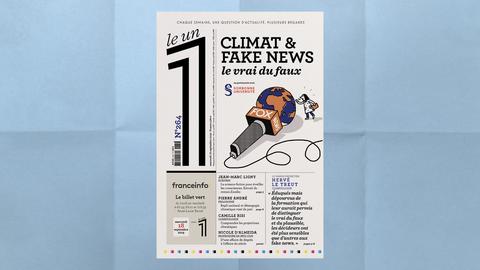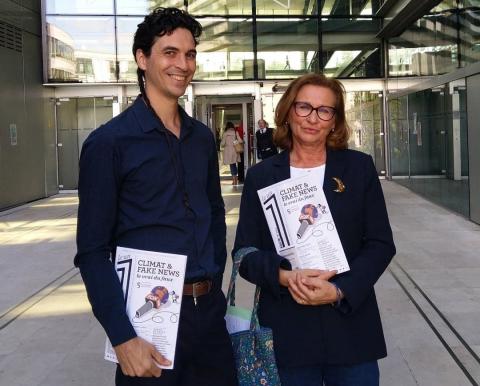
Fake news and the climate
Wednesday, September 18, 2019, on the occasion of the publication of the issue "Climate and fake news: the real from the fake" of the weekly magazine le 1, produced in partnership with Sorbonne University, discover the article written by Nicole d'Almeida, professor at CELSA-Sorbonne University.
How the climate has become the issue of the centruy
The summer of 2019 brought us an unprecedented event: July was ranked as the hottest month ever measured in the world, while in August, Iceland made a spectacular gesture to commemorate one of the largest glaciers in Europe that has now disappeared from its territory.
The climate question is a key issue this fall. Its intensity is linked to the publicity work carried out by social actors and its acuteness is accelerated today by a climatic experience that takes the figures out of the abstract and gives them a tangible reality. The climate is experienced directly by the body during these heatwaves, which have lost their exceptional character, trying moments of reorganization of lifestyles, work and transport, and the realisation of our bodies' forgotten fragilities. Climate change is no longer just a number, a curve, or disaster-themed films, it has become a real individual and collective experience.
In the history of environmental concerns, climate change is now taking a central place, somewhat eclipsing the problems of pollution and biodiversity. It is at the heart of a globalized discussion on the conditions of life on Earth. Climate is no longer a long-term scientific issue, far away from us. It is no longer considered independently of human activities. It becomes our business, here and now, a matter of degrees that has become a matter of the century, mobilizing moral questions (questioning the conditions of human life), political questions (putting forward principles of justice and solidarity), economic questions (models of growth) and aesthetic questions (destruction or disappearance of landscapes).
There is no public problem in itself, but problems that have become public, due to the intervention of groups of actors who appropriate and shape them, each in their own way. The climate issue is marked as much by convergence as by divergence: convergence of the public groups who take it over and place it at the center, divergence of analyses and recommendations. It is structured by a movement that is both centripetal (bringing people together) and centrifugal (distending and dividing). Agreement and disagreement on this subject are in permanent balance, based on the subtle interweaving of knowledge and will, of the state of knowledge and political will. The climate issue is situated halfway between scientific knowledge and political choice, and it is in this in-between that the work of information takes place, with missions to raise awareness, sound the alarm, educate and invite debate or change. Enunciation and denunciation are combined in a world of information boosted by social networks, where the truth rubs shoulders with the false, where the status of sources is often uncertain, where information and disinformation are opposed.

Emmanuel Vincent, docteur en océanographie et climat de Sorbonne Université et Nicole d'Almeida lors de l'enregistrement de l'émission "Ouvrez le 1" sur FranceInfo TV
Emmanuel Vincent, PhD in oceanography and climate from Sorbonne University and Nicole d'Almeida during the recording of the program "Ouvrez le 1" on FranceInfo TV.
Read the full article in French with Nicole d'Almeida1 accompanied by Emmanuel Vincent, PhD in oceanography and climate from Sorbonne University, founder of Climate Feedback and Julien Bisson, editor in chief of the weekly magazine "Le 1" in the program "Ouvrez le 1" on FranceInfo TV.
1 Nicole d'Almeida is a professor of information and communication sciences at CELSA-Sorbonne University, she notably edited the book Développement durable, une communication qui se démarque (Presses de l'Université du Québec, 2018) with Solange Tremblay and Thierry Libaert.
